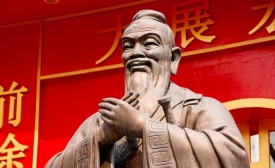hu jintao

Sir Martin Davidson analyzes why China's soft power ranking does not match the amount it spends.
Real power in global governance requires intellectual input into the international financial and economic agenda, policies and rules — the effective exercise of ‘soft’ power. [...] The major substantial outcomes of the G20 to date, including updating international financial regulatory rules through Basel III and international tax cooperation on tax havens, have been mostly led by the Atlantic countries.
Communist Party general secretary Hu Jintao highlighted the need for China to become a global cultural power - matching its rising economic clout - in his report to the party's 18th national congress yesterday. "Cultural strength and competitiveness symbolise a country's economic strength and its national revitalisation," he said.
...as a part of larger scheme of building up China’s “soft power.”... Xi’s trip to Iowa is evidently designed to do just that, projecting an image not of a Communist dictator, but a caring leader of a modern nation who cherishes his friendship with Americans, in the hopes of garnering some American goodwill.
Beijing isn't satisfied simply with controlling domestic TV news and the Internet. It wants to control the Chinese cultural diet. And the appetite goes outside China's borders, as well. Beijing wants more "soft power."
...western media have taken Hu’s remarks as a sign China’s rulers are principally concerned with the corrosive influence of western soft power, Pirates of the Caribbean outshining the state-backed Founding of a Republic.
The precise reason for penning the editorial now is still unclear, but it seems likely intended to address both concerns about a crisis of values in Chinese society, and the Chinese leader’s keen interest in developing the country’s soft power by creating internationally popular media.
President Hu Jintao will travel to the United States for his third official visit as China’s leader this week. It may be his last before he hands over power to his apparently designated successor, Vice President Xi Jinping, in 2012.







